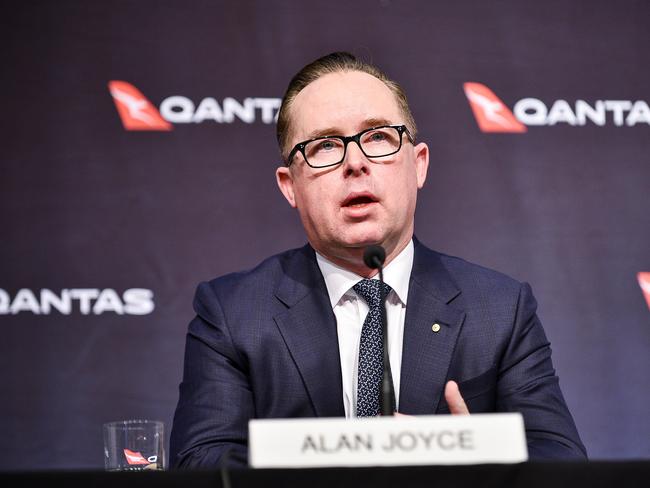Workplaces where COVID-19 vaccine may become mandatory
A future COVID-19 vaccine could become compulsory for some Australian workers, forcing them to get the jab or lose their job. Have your say in our poll.
Coronavirus
Don't miss out on the headlines from Coronavirus. Followed categories will be added to My News.
A future COVID-19 vaccine could become compulsory for some Australian workers, forcing them to get the jab or lose their job.
Following Qantas chief executive Alan Joyce’s comments that international passengers would require the vaccine to travel, Australians have been asking who else can enforce this rule.
Qantas declined to comment on any employee policies in the works, with a spokesman saying “we’re still pretty much in the early days of this”.
Other major employers contacted by News Corp Australia, including Virgin Australia Group, Woolworths, Bunnings Warehouse, PwC, Commonwealth Bank and the Australian Government’s Department of Social Services, had also not yet made a decision regarding staff vaccinations.

Australian Retailers Association chief executive Paul Zahra said it was too early to forecast what government or industry would do once a vaccine became available, but that it would be vital for consumer and business confidence, particularly as government stimulus faded.
“Without the vaccine, we are likely to remain suspended in what we are currently calling COVID-normal,” Mr Zahra told News Corp Australia.
“This leaves many question marks around everyday activities such as workers returning to CBD office locations, the return of regular events – arts, culture, restaurants and entertainment and hence, for retailers all the associated spending on discretionary items like fashion.”
Aged care workers nationally are already required to have the influenza vaccine, with the only exemptions for people with a history of anaphylaxis or Guillain-Barré Syndrome following vaccination and people on check point inhibitor drugs for cancer treatment.
Early learning provider Goodstart Early Learning also declared it a requirement of employment in June, despite it not being compulsory in the child care sector broadly.
Goodstart declined to comment on whether this would be extended to the COVID-19 vaccine once it was available.
The organisation, with 644 childcare centres nationally, has faced two dismissed cases of unfair dismissal from employees who lost their jobs after refusing flu vaccination on non-medical grounds since the policy was introduced.
Both were filed outside of the time required, however, in a November 18 decision Fair Work Commission deputy president Ingrid Asbury said: “While I do not go so far as to say that the Applicant’s case lacks merit, it is my view that it is at least equally arguable that the Respondent’s policy requiring mandatory vaccination is lawful and reasonable in the context of its operations which principally involve the care of children, including children who are too young to be vaccinated or unable to be vaccinated for a valid health reason.”
Another former Goodstart employee will have a hearing in January.
She is being represented by lawyer Nathan Buckley, who went viral for telling Melbourne residents they did not need to wear masks during the outbreak and started a crowd-funding campaign to sue the nation’s governments and remove all lockdown restrictions.

Griffith University employment relations and human resources lecturer Dr Ben French said employers risked claims of unfair dismissal and discrimination if they introduced compulsory vaccinations for staff of their own accord, but policies could become commonplace if backed by government.
“For employers’ sake, I hope that when the vaccine comes out there will be a government directive around aged care, child care, emergency and healthcare and anywhere there is vulnerable people … similar to government directives we have seen about staff working at aged care homes,” he said.
“It’s going to be about what is practical and reasonable proportionate to the industry.
“Employers aren’t allowed to simply dictate who has a medical procedure.”
Dr French said compulsory vaccination was unlikely to include customer-facing roles in the retail sector, and almost certainly would not include anyone who was able to work remotely.
“If an employee could complete their work remotely or didn’t come into contact with vulnerable people, then employers would need to make accommodations,” he said.
Workplace relations specialist Employsure managing director Ed Mallett said, however, vaccinations could potentially be made compulsory for employees of international airlines.
“It wouldn’t be out of the ordinary for the Government to legislate mandatory use of vaccines in certain industries as it becomes available – such as employees engaged in international air travel – to help protect the community from further outbreaks and spread of COVID-19,” he said.
There are also speculations over whether the Australian Government’s “No jab, no pay” policy will be extended to include the COVID-19 vaccine.
Under the existing policy, family and childcare payments are withheld from Australians that refuse to vaccinate their children for non-medical reasons.
An Australian Government Department of Health spokesperson declined to answer that particular question but said it was the Government’s position that any COVID-19 vaccine would be free and voluntary for Australians.
“Vaccines will only be rolled out once strict safety and efficacy studies have been completed,” they said.
“The Government will continue to consult and take medical advice regarding any additional requirements for those working with the highly vulnerable such as the elderly.
“We are confident, given Australia’s high vaccination coverage rates, Australians will take up a safe and effective COVID-19 vaccine in equally high numbers.”
Health Minister Greg Hunt said earlier this month, however, “at this stage, there are no plans to impose or to draw upon other programs, such as the no jab, no pay”.




